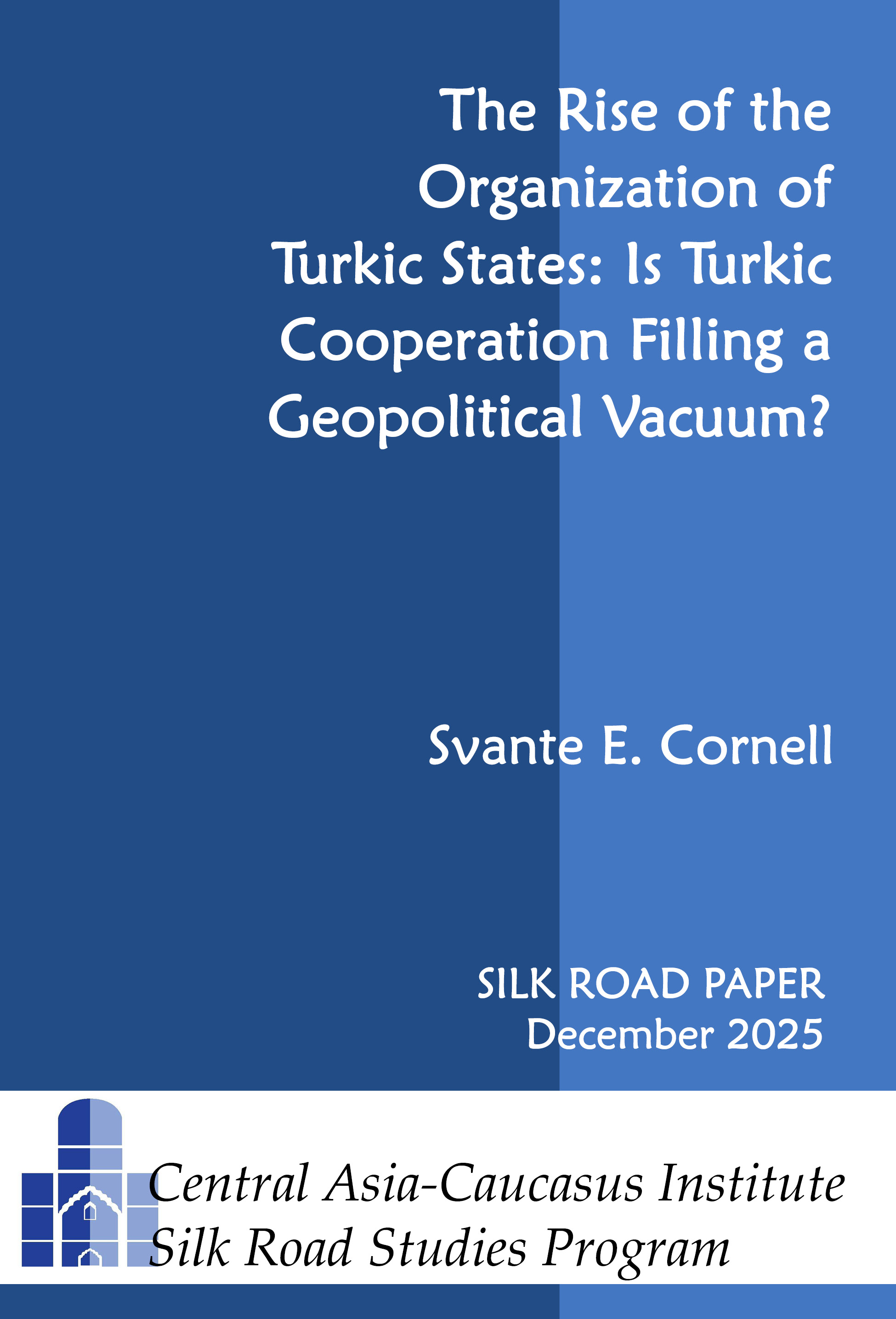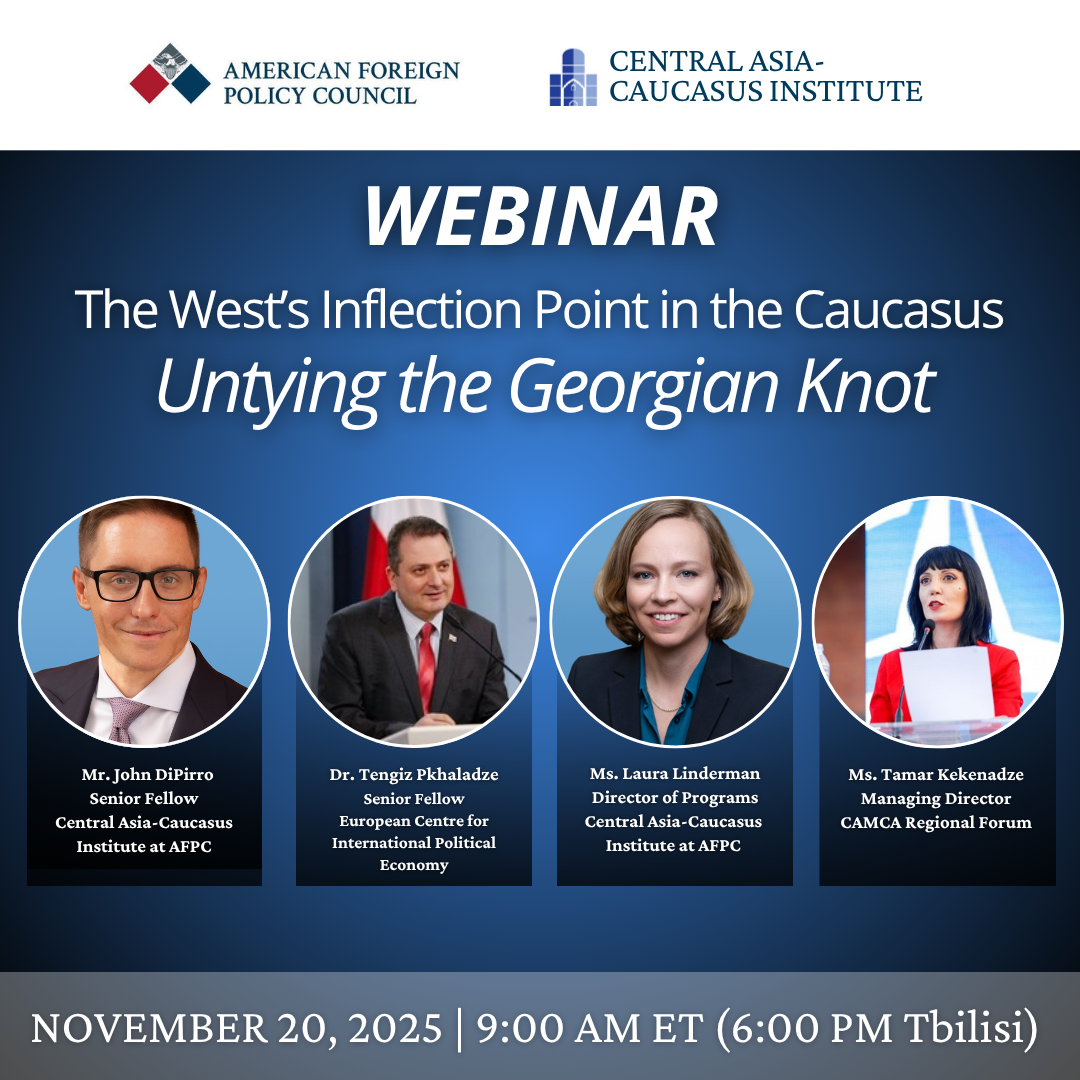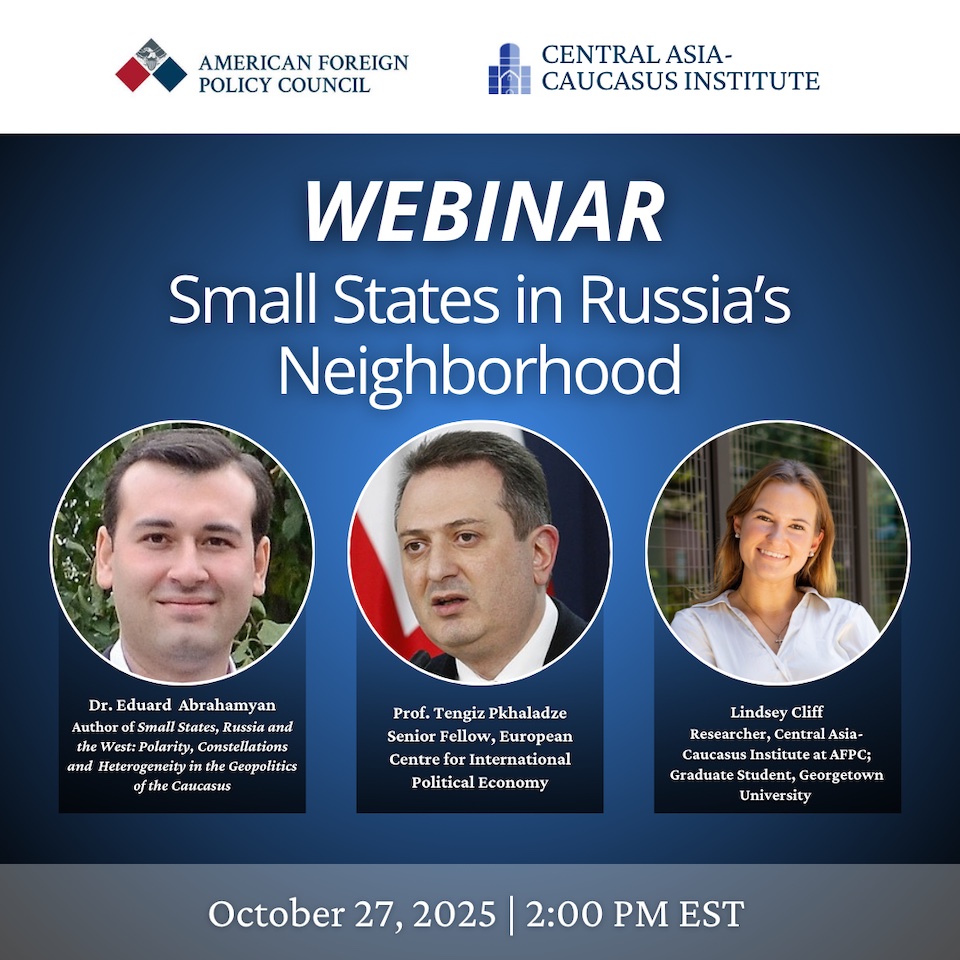The Rise of the Organization of Turkic States: Is Turkic Cooperation Filling a Geopolitical Vacuum?
By Svante E. Cornell
Central Asia-Caucasus Institute & Silk Road Studies Program
Silk Road Paper
December 2025
Click Here to Download
Executive Summary:
In October 2025, the Organization of Turkic States (OTS) convened a pivotal summit in Gabala, Azerbaijan, demonstrating its emergence as a significant geopolitical entity on the Eurasian landscape. During the summit, Azerbaijani President Ilham Aliyev emphasized the OTS's evolution into a key geopolitical center, while Kazakh President Kassym-Jomart Tokayev referred to it as an authoritative structure uniting Turkic populations. This gathering marks a critical juncture in the organization’s development, solidifying its influence in a region that links the Mediterranean to Central Asia.

The Gabala summit showcased the OTS's commitment to enhancing collaboration on various fronts, including security, defense, economic development, transportation, digitalization, and sustainable energy. A notable development was the introduction of the "OTS plus" framework, which aims to strengthen partnerships with non-Turkic states in the vicinity. This evolution reflects a remarkable transformation for Turkic cooperation, escalating from modest aspirations to a robust international organization in a remarkably short period.
The emergence and rapid development of the OTS challenge conventional frameworks employed by Western bureaucracies to assess the geopolitics of the region. Typically categorized into rigid geographic divisions, bureaucracies covering the Middle East, Europe, and Central Asia often overlook the intricate relationships across these boundaries. Turkic cooperation ignores these geographic categorizations, as it not only resides within the context of former Soviet republics but also includes Turkey—a pivotal player straddling both Europe and the Middle East.
A key element of Turkic Cooperation is the relatively equal standing of its members. While Türkiye is obviously considerably larger than the other members, it is telling that the main drivers of Turkic cooperation for many years were Kazakhstan and Azerbaijan; and that Turkic cooperation really took off following Uzbekistan’s renewed enthusiasm for the initiative. In other words, the perception of the OTS as somehow beholden to Turkish President Erdogan is a red herring.
The ethnolinguistic character of Turkic cooperation has led many observers to remain skeptical, as it has led to the exclusion of non-Turkic states. Yet on a practical level, the OTS has displayed an openness to cooperate with countries like Georgia; more recently, the inclusion of an “OTS plus” format could create conditions for a more inclusive approach to regional states that are not majority Turkic.
Given the current geopolitical climate, the rise of the OTS is poised to reshape power dynamics across a broad expanse of territory, prompting a reevaluation of strategic frameworks by Western governments and multilateral organizations. Understanding the implications of the OTS's evolution will be crucial for policymakers and stakeholders engaged in the region and beyond.
Webinar Recap: Small States in Russia's Neighborhood
On October 28th, 2025, the Central Asia-Caucasus Institute at the American Foreign Policy Council hosted a webinar introducing Dr. Eduard Abrahamyan’s new book Small States, Russia, and the West: Polarity, Constellations, and Heterogeneity in the Geopolitics of the Caucasus. The book explores how small states in the Caucasus navigate intense great-power competition, particularly amid Russia’s resurgence as a regional power. Abrahamyan argues that these nations’ foreign policies reflect not only Russian or Western influence but also their unique cultures, domestic power dynamics, and worldviews. Using an expanded Constellation Theory, he provides a fresh framework for understanding how non-Western regional orders form in today’s increasingly multipolar world.
Watch the full discussion here or on YouTube!
The discussion explores three strategic shocks that Abrahamyan examines in his book. He notes that despite similar geopolitical realities, the three Caucasus states have varied responses to the 2008 invasion of Georgia, 2014 occupation of Crimea, and 2022 full-scale invasion of Ukraine. Vitally, the speakers also focus on the potential for greater regional unity and strategic development, and emphasize the importance of this region, noting that “what happens in the South Caucasus rarely stays there”—highlighting its broader strategic significance.
Feature Speakers:
Dr. Eduard Abrahamyan is a Senior Research Fellow at the Yerevan-based Institute for Security Analysis and a Teaching Fellow in International Relations at University College London. He served as an aide to the President of the Republic of Armenia on foreign affairs from 2019 to 2021 and was a Rumsfeld Fellow in 2017.
He spoke in conversation with Prof. Tengiz Pkhaladze, Professor at the Georgian Institute of Public Affairs and a Senior Fellow at the European Centre for International Political Economy. Previously, Pkhaladze was an Advisor and Foreign Relations Secretary to the President of Georgia. Dr. Pkhaladze previously served as Chairman of the International Centre for Geopolitical Studies (2008–2014). Both Dr. Abrahamyan and Dr. Pkhaladze are former CAMCA (Rumsfeld) Fellows.
The discussion was introduced by Lindsey Cliff, a Researcher at AFPC’s Central Asia-Caucasus Institute and a graduate student in Georgetown’s Center for Eurasian, Russian, and East European Studies.
Webinar: The West's Inflection Point in the Caucasus: Untying the Georgian Knot
The Central Asia-Caucasus Institute at the American Foreign Policy Council (AFPC) is excited to invite you to register for our upcoming webinar "The West's Inflection Point in the Caucasus: Untying the Georgian Knot."

Featured Speakers:
John DiPirro: Senior Fellow in Eurasia at the American Foreign Policy Council and Senior Fellow with the Central Asia-Caucasus Institute
Tengiz Pkhaladze: Senior Fellow at ECIPE and Associate Professor at the Georgian Institute of Public Affairs
Laura Linderman: Senior Fellow and Director of Programs at the Central Asia-Caucasus Institute of the American Foreign Policy Council
Moderated by: Tamar Kekenadze, Associate Professor of Politics and Head of the Advanced Research and Policy Development Institute at the British University in Georgia and Managing Director of the CAMCA Regional Forum
Register here!
Webinar: Small States in Russia's Neighborhood
The Central Asia-Caucasus Institute at the American Foreign Policy Council (AFPC) is excited to invite you to register for our upcoming webinar “Small States in Russia’s Neighborhood."
Register here!
The webinar will cover Dr. Eduard Abrahamyan’s new book Small States, Russia and the West: Polarity, Constellations and Heterogeneity in the Geopolitics of the Caucasus. The book explores how small states in the Caucasus navigate intense great-power competition, particularly amid Russia’s resurgence as a regional power. Abrahamyan argues that these nations’ foreign policies reflect not only Russian or Western influence, but also their unique cultures, domestic power dynamics, and worldviews. Using an expanded Constellation Theory, he provides a fresh framework for understanding how non-Western regional orders form in today’s increasingly multipolar world.
Feature Speakers:
Dr. Eduard Abrahamyan is a Senior Research Fellow at the Yerevan-based Institute for Security Analysis and a Teaching Fellow in International Relations at University College London. He served as an aide to the President of the Republic of Armenia on foreign affairs from 2019 to 2021 and was a Rumsfeld Fellow in 2017.
He will be in conversation with Prof. Tengiz Pkhaladze, Professor at the Georgian Institute of Public Affairs and a Senior Fellow at the European Centre for International Political Economy. Previously, he was an Advisor and Foreign Relations Secretary to the President of Georgia. Dr. Pkhaladze previously served as Chairman of the International Centre for Geopolitical Studies (2008–2014).
Both Dr. Abrahamyan and Dr. Pkhaladze are former CAMCA (Rumsfeld) Fellows.
The discussion will be introduced by Lindsey Cliff, a Researcher at AFPC’s Central Asia-Caucasus Institute and a graduate student in Georgetown’s Center for Eurasian, Russian, and East European Studies.
Register here!
Purchase the book here!
Greater Central Asia as a Component of U.S. Global Strategy
By S. Frederick Starr
Central Asia-Caucasus Institute & Silk Road Studies Program
Silk Road Paper
October 2024
Introduction
 What should be the United States’ strategy towards Central Asia, the Caucasus, and the region of Greater Central Asia (GCA) as a whole? Should it even have one? Unlike most other world regions, these lands did not figure in US policy until the collapse of the USSR in 1991. Though the new Baltic states entered Washington’s field of vision in that year, in those cases the Department of State could recall and build upon America’s relations with independent Estonia, Latvia, and Lithuania during the inter-war decades. For the US Government after 1991, GCA was defined less as sovereign states than as a group of “former Soviet republics” that continued to be perceived mainly through a Russian lens, if at all.
What should be the United States’ strategy towards Central Asia, the Caucasus, and the region of Greater Central Asia (GCA) as a whole? Should it even have one? Unlike most other world regions, these lands did not figure in US policy until the collapse of the USSR in 1991. Though the new Baltic states entered Washington’s field of vision in that year, in those cases the Department of State could recall and build upon America’s relations with independent Estonia, Latvia, and Lithuania during the inter-war decades. For the US Government after 1991, GCA was defined less as sovereign states than as a group of “former Soviet republics” that continued to be perceived mainly through a Russian lens, if at all.
Over the first generation after 1991 US policy focused on developing electoral systems, market economies, anti-narcotics programs, individual and minority rights, gender equality, and civil society institutions to support them. Congress itself defined these priorities and charged the Department of State to monitor progress in each area and to issue detailed country-by-country annual reports on progress or regression. The development of programs in each area and the compilation of data for the reports effectively preempted many other areas of potential US concern. Indeed, it led to the neglect of such significant issues as intra-regional relations, the place of these countries in global geopolitics, security in all its dimensions, and, above all, their relevance to America’s core interests. On none of these issues did Congress demand annual written reports.
This is not to say that Washington completely neglected security issues in GCA. To its credit, it worked with the new governments to suppress the narcotics trade. However, instead of addressing other US-GCA core security issues directly, it outsourced them to NATO and its Partnership for Peace Program (PfP). During the pre-9/11 years, PfP programs in the Caucasus and Central Asia produced substantial results, including officer training at the U.S. Army’s program in Garmisch-Partenkirchen, Germany, and the Centrasbat, a combined battalion drawn from four Central Asian armies. But all these declined after 9/11 as America focused its attention on Afghanistan.
Today this picture has dramatically changed, and the changes all arise from developments outside the former Soviet states. First came America’s precipitous withdrawal from Afghanistan, which brought important consequences. As the U.S. withdrew, new forces—above all China but also Russia and the Gulf States—moved in. Also, America’s pullout undercut the region’s champions of moderate Islam and reimposed a harsh Islamist regime in their midst. And, finally, because Central Asians have always considered Afghanistan as an essential part of their region and not just an inconvenient neighbor, they judged the abrupt U.S. pullout as a body blow to the region as a whole. Now the scene was dominated not by the U.S. but by China and Russia competing with each other. Both powers presented themselves as the new bulwarks of GCA security, and reduced the U.S. to a subordinate role.
While all this was going on, the expansion of China’s navy and of both Chinese and European commercial shipping called into question the overriding importance of transcontinental railroad lines and hence of GCA countries. Taken together, these developments marginalized the concerns and assumptions upon which earlier US strategy towards GCA had been based. With Afghanistan no longer a top priority, American officials refocused their attention on Beijing, Moscow, Ukraine, Israel, and Iran, in the process, increasing the psychological distance between Washington and the countries of Central Asia and the Caucasus.
It did not help that no U.S. president had ever visited Central Asia or the Caucasus. This left the initiative on most issues to the GCA leaders themselves. Thus, it was Kazakhstan and not the State Department that proposed to the U.S. government to establish the C5+1 meetings. It was also thanks to pressure from regional leaders that the White House arranged for a first-ever (but brief) meeting between Central Asian presidents and the President of the United States, which took place in September 2023 on the sidelines of the United Nations General Assembly in New York. By comparison, over the previous year Messrs. Putin and Xi Jinping had both met with the regional presidents half a dozen times. Hoping against hope, the Central Asian leaders hailed the C5+1 meeting as a fresh start in their relations with Washington. Washington has done little to validate this


